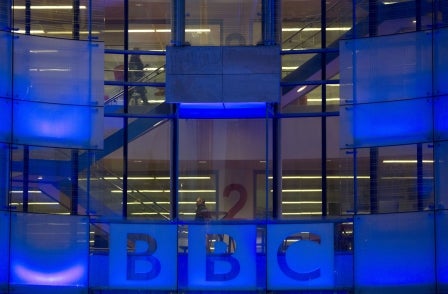
The National Union of Journalists and broadcast union BECTU have announced plans to take strike action at the BBC over Easter.
The unions said the action is being taken in protest at compulsory redundancies, excessive workloads, bullying and harassment.
The BBC is shedding some 2,000 jobs under the Delivering Quality First programme and the NUJ is particularly opposed to compulsory redundancies. According to the BBC, some 30 journalists are at risk of compulsory redundancy.
The NUJ said that a new strike ballot had resulted in a 61.2 per cent vote in favour of strike action and 79.9 per cent ion in favour of action short of a strike.
Last month the NUJ led a nationwide journalists' strike at the BBC.
According to the BBC, it had to cancel and replace 17 hours and 58 minutes of broadcast news output for licence fee BBC radio and television networks throughout the day on 18 February.
This included the cancellation of Today on Radio 4. The corporation has estimated that 1,935 individuals took part in the last stoppage.
The NUJ said BBC members in Scotland will be on strike on Friday and Monday over and that there will be a “demonstration of solidarity” at New Broadcasting House on Friday, while all members will be observing a work to rule.
Further action for the Easter period, in collaboration with BECTU, is expected to be announced tomorrow.
The NUJ and BECTU have called for a six-month moratorium to discuss the cuts.
In addition the NUJ has provided evidence to the BBC’s review on policies and processes relating to sexual harassment. This comes, according to the NUJ, after allegations that there was a “culture of endemic sexism and harassment” at the BBC.
The NUJ said a request for confidential evidence resulted in “huge” response showing a “picture of widespread bullying and harassment and the management’s failure to deal with the perpetrators”.
In a statement, NUJ secretary general Michelle Stanistreet said:
“It is disappointing that once again the BBC has decided not to properly engage, refusing our call for a moratorium to give space for meaningful discussions on the worrying impact of the cuts. BBC executives know they've got a major problem on their hands – the recent investigation into bullying and harassment has lifted the lid on a problem that has been allowed to grow to shocking levels, under the noses of senior executives supposed to be responsible for upholding 'BBC values'.
“We hope the forthcoming Respect at Work report will be a positive step forward in tackling a problem that has become institutionalised – but it's hard to believe that there's a real commitment to change when we're seeing cases of people who have been targeted, bullied and unfairly picked off being rushed out of the door. Compulsory redundancies being pushed through at the same time as jobs are being advertised externally is not just bad management, it's a waste of licence fee money.
“The BBC is adamant that the cuts are having no impact on quality. NUJ members know this is bunkum – they are the ones dealing with the real impact of cuts that have been targeted directly at frontline programming, they can see that corners are being cut, that staff are being put under huge pressure to deliver with fewer resources, and inevitably quality journalism is compromised. Calling their package of 20 per cent cuts Delivering Quality First was always a nonsense and an insult – and it is becoming clearer every day that these cuts, which are being badly implemented from the top, are diminishing quality journalism at our public service broadcaster.”
Email pged@pressgazette.co.uk to point out mistakes, provide story tips or send in a letter for publication on our "Letters Page" blog

